Court temporarily stays order that could be drag on health care workforce
By JULIE MINDA and BETSY TAYLORSeveral Catholic health care systems have called President Donald Trump's executive order imposing a 90-day travel ban on nationals from seven predominantly Muslim countries and barring Syrian refugees indefinitely from entry into the United States "disappointing" and "confusing" and pledged their support for clinicians, medical residents and other employees affected by the unexpected executive order.
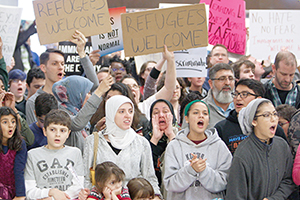
Photo by G. Morty Ortega/Getty Images News
The executive order, signed Jan. 27, bars people from Iran, Iraq, Libya, Somalia, Sudan, Syria and Yemen from entering the United States for 90 days. It prevents all refugees from entering the country for 120 days and suspends the entry of Syrian refugees indefinitely. After the order was issued, immigration officials detained several refugees and people from impacted countries when they deplaned at U.S. airports. Others were not allowed to board planes at their departure airports.
The order prompted widespread public protests and ongoing legal challenges in several U.S. courts, one of which produced a temporary order lifting the ban nationwide.
The executive order directs senior administration officials to review the stringency of screening procedures for foreign nationals seeking to enter the U.S. to "ensure that adequate standards are established to prevent infiltration by foreign terrorists or criminals." Opponents of the ban maintain that the order illegally targets Muslims — a charge the White House denies — and that individuals with valid visas should be allowed to enter the U.S.
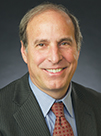
The executive order set off widespread confusion over whether it prohibited the entry or re-entry into the U.S. of people with legal permanent resident status who are nationals of one of the affected countries. On Feb. 1, White House counsel said the executive order did not apply to individuals in this group.
There were media reports around the nation about a handful of clinicians from the affected countries being unable to enter or return to the U.S. Catholic health care systems and secular organizations said the immigration ban could make it harder to recruit foreign-born clinicians and medical students, who are more likely to take assignments in medically underserved communities.
Statements of solidarity
Numerous Catholic organizations, associations and congregations issued statements expressing concern about the travel ban and declaring their support for immigrants, especially refugees who might be adversely impacted by the travel restrictions.
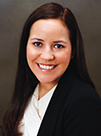
Three bishops representing the United States Conference of Catholic Bishops said in a statement that the executive order had "generated fear and untold anxiety among refugees, immigrants and others." Archbishop William E. Lori, Bishop Mitchell T. Rozanski and Bishop Oscar Cantú wrote that the USCCB stands in solidarity with those affected by the order, and especially Muslims. The statement said that while U.S. bishops recognize the government's "duty to protect the security of its people, we must nevertheless employ means that respect both religious liberty for all, and the urgency of protecting the lives of those who desperately flee violence and persecution."
CHA is urging its members to support the USCCB's efforts to protect refugees and immigrants by contacting elected officials to oppose the executive order. The bishops' conference provides a link on its website for sending emails to elected officials, and sample language to use.
Vital role
Providence St. Joseph Health of Renton, Wash.; Trinity Health of Livonia, Mich.; CHRISTUS Health of Irving, Texas; and Avera Health of Sioux Falls, S.D., are ministry providers that issued statements or spoke to Catholic Health World about their apprehensions in regard to the executive order.
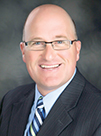
Dr. Rod Hochman, Providence St. Joseph Health's president and chief executive, wrote on his blog that more than 300 of the health care system's care providers are nationals or dual nationals of the seven countries named in the executive order. "They play a vital role in the health of those we serve, bringing highly needed, highly technical skills to our communities." He said their work "literally saves lives."
He said the affected providers include physicians who come to the United States to learn the latest medical techniques and to advance health care in their home countries.
At the ready
Hochman wrote in his blog post that "many of our affected caregivers are unclear and anxious about what this executive action means for them and their families." He wrote that Providence St. Joseph is monitoring the situation and will support its associates.
Top executives of Trinity Health said in a Jan. 31 correspondence to system office colleagues that Trinity is identifying how best to support affected colleagues. Trinity urged colleagues who are nationals and/or citizens of the countries listed in the order to consult an attorney to learn what their travel risks may be. Trinity offered to provide legal counsel to colleagues and medical staff and other affiliated clinicians in need of it.
Gabriela Saenz is vice president of advocacy and government affairs for CHRISTUS. She said that while CHRISTUS is not aware of specific associates impacted by the order, it is investigating who might be affected, and plans to assist any associate harmed by the restrictions.
Workforce shortage
The Medicus Firm, a Dallas-based physician recruiting company, said more than 15,000 doctors in the United States are from the seven Muslim-majority countries covered by the travel ban, including about 9,000 from Iran, about 3,500 from Syria and about 1,500 from Iraq.
Saenz said, "We have concerns that this order could cause disruption for health care workers, as many are trained abroad and need to be able to travel to the U.S."
She added that as an international organization — CHRISTUS operates health care facilities in three countries besides the United States — "we know a strong workforce is critical to ensuring the best quality of care," and associates from other nations are a critical part of that workforce.
Bob Sutton is executive vice president of human resources for Avera, a system that predominantly serves rural communities throughout the Midwest. He said that any new limitation on legal immigration is problematic from a workforce standpoint. He said it is increasingly difficult to recruit workers of all stripes — from physicians to housekeepers — to rural communities. Rural health care facilities have become extremely reliant on immigrants to staff difficult-to-fill positions. And, Sutton said, the need for foreign-born workers will only increase, since the United States-born workforce is aging and will not keep up with the demand for workers.
Sutton said while Avera appreciates that the government has a right to secure the border, it is important to recognize there are consequences for restricting immigration.
Welcoming the stranger
The future of the travel ban is unclear. As Catholic Health World went to press, the temporary restraining order issued Feb. 3 by Judge James Robart, a federal district court judge in Seattle, created a nationwide stay on enforcing the executive order. In a Feb. 9 order, a three-judge panel of the United States Court of Appeals for the Ninth Circuit in San Francisco unanimously refused the government's motion to immediately reinstate the travel ban. The litigation continues.
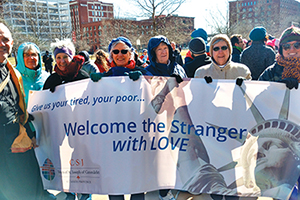
Photo by G. Morty Ortega/Getty Images News
Also on Feb. 3, Providence sent a letter summarizing its concerns about the order to members of Congress who represent communities served by Providence. In the letter, Hochman wrote, "It is our hope that reforms to immigration policy balance our nation's historic embrace of new immigrants with our nation's security and economic needs. We encourage you to work with the Trump Administration to craft immigration and refugee policy that ensures human rights are protected, and that the inherent dignity of every person is recognized."
Saenz said that CHRISTUS has been asking its elected officials to support a revocation of the executive order "based on the harm it will cause vulnerable refugees, immigrant families and our employees."
Long-held organizational values — most notably compassion and equity — compel CHRISTUS to oppose the travel restrictions, she said.
In a message to system office colleagues, Trinity's top executives wrote of their disappointment in the executive order. President and Chief Executive Dr. Richard J. Gilfillan was joined by mission executive Sr. Mary Ann Dillon, RSM, and human resources head Ed Hodge in stating "we believe that welcoming immigrants, refugees and newcomers is an act of love and hope."
Catholic organizations, congregations react to travel ban Catholic congregations and associations were among the many groups that issued statements opposing President Donald Trump's executive order temporarily banning travelers from seven predominantly Muslim nations from entering the U.S., suspending refugee admission to the U.S. for 120 days and barring refugees from Syria indefinitely. A federal district court in Washington stayed the ban Feb. 3, eight days after it was issued.
|
